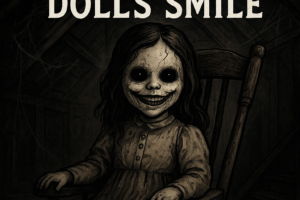Introduction:
“The Silent Observer” is a story that will make you question the reality of the world if you are a fan of psychological short stories that look into the dark recesses of the human mind. Set against the backdrop of one man’s descent into paranoia and obsession, this story masterfully unravels the disturbing effects of being watched—not by someone visible, but by a force that knows your deepest secrets. Not only does “The Silent Observer” entertain, but it also disturbs, agitates, and lingers long after the last word is said. This is a psychological short story that never lets go of its grip.
The Silent Observer A Disturbing Tale Among Psychological Short Stories
The Beginning of the Unknown
It started on a regular Tuesday morning. When Delhi-based graphic designer Ravi Sharma, 37, got home from his morning jog, he discovered a plain white envelope hidden under his apartment door. No stamp, no address, just the words:
“I see you chose the red t-shirt today. Good choice.”
He paused, perplexed. He had chosen a red t-shirt for his run, it was true. He surveyed the room from above to below. Empty. Brushing it off as a prank, he tossed the note away. However, another envelope arrived the following day.
“Did you skip your run? Ravi, your body needs consistency.
His heart raced. He hadn’t told anyone that day that he wasn’t going out. Who was watching him?
When the Notes Turn Personal
The notes became more intrusive by the week’s end. “Don’t you still feel bad about not calling your mother the year before? You think about it every night.”
Ravi stopped. No one knew that—not even his closest friends. The writing was clean and without emotion. He began installing cameras, changing passwords, and locking all of his windows.
He contacted the police. They did not discover any fingerprints or video of anyone approaching his door. Despite the tight security of the building, letters continued to arrive.
Psychological Short Stories Unfold in Real Life
Soon, Ravi’s life unraveled. His work performance dipped. He became reclusive, cancelling social outings, checking corners, staring at shadows. He lost confidence with each note.
“She’s not into you. You’re just a secure alternative.”
This one occurred following his conversation with a woman in a café.
“Stop pretending you’re okay. You aren’t.”
This came the night he tried to sleep with the lights on.
His friends became more worried. One even suggested therapy.
“I’m being observed!” he yelled during a confrontation. “Someone has all the information about me!”
But to them, he looked like someone losing touch.
The Observer or the Observed?
Ravi began investigating. He stopped working. To observe himself, he rented a separate apartment across the street. He sat behind dark curtains, watching his apartment, waiting.
But no one ever approached.
He watched for a week, but one night, he found another envelope in his new hiding place instead of his old one. /
“Watching yourself won’t help. You still can’t see the truth.”
That crushed him. Either this person had superhuman abilities—or it was something else entirely.
He spiraled. He was consumed by paranoia. He smashed mirrors, covered cameras, stopped answering his phone. Was he under surveillance? Or was he watching himself break down?
The Final Note
Then, the last note arrived.
“There is not an “other.” You have always been it. You’ve known all along. “I’m you.”
Ravi collapsed. Everything made sense and nothing did. His own writing was in the handwriting. It all fit, from the style to the phrasing. Did he write the notes in a state of haze? Was his brain divided in two?
Days later, the police found him malnourished, delirious, and surrounded by dozens of letters written by him.
Ravi was admitted to a psychiatric facility, diagnosed with a rare form of dissociative identity disorder.
The Silent Observer was never caught—because he had always been within.
Why “The Silent Observer” Stands Out in Psychological Short Stories
This story is about the breakdown of self, not just being watched. In the realm of psychological short stories, “The Silent Observer” challenges our understanding of sanity, self-awareness, and the fragile boundaries of identity.
FAQs: Psychological Short Stories
- What makes psychological short stories different from other genres?
Psychological short stories focus on the mental and emotional states of characters, often blurring the line between reality and delusion. They explore inner conflicts, paranoia, and identity.
- Why are psychological short stories so impactful?
They tap into universal fears—losing control, being watched, not knowing what’s real. Their short format makes the suspense and twists hit harder.
- Who are the most famous authors in this genre?
Writers like Edgar Allan Poe, Shirley Jackson, and more recently, Gillian Flynn and Stephen King, are known for their chilling psychological short stories.
- How can I start writing psychological short stories?
Begin by focusing on internal conflict. Create characters with deep psychological complexities and gradually reveal their unraveling minds through events or interactions.
- Are psychological short stories based on real mental conditions?
Many draw inspiration from real psychological disorders like schizophrenia, dissociative identity disorder, and anxiety, but they often take creative liberties for dramatic effect.
















Add Comment